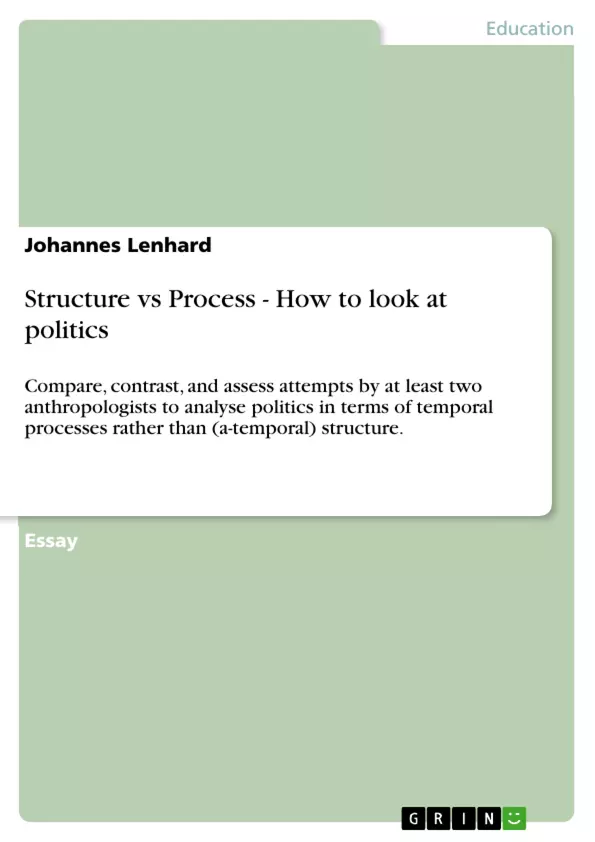Compare, contrast, and assess attempts by at least two anthropologists to analyse politics in terms of temporal processes rather than (a-temporal) structure.
Edmund Leach published his account of the Kachin society in Highland Burma in 1954, fourteen years after Evans-Pritchard’s and Fortes’ classical structural-functionalist collection on ‘African Political Systems’. Only four years after Leach, Barth’s ‘Swat Pathans’ enters the debate. Both Barth and Leach differ remarkably in their methodological approach fousing on change and process. While Radcliffe-Brown (Fortes & Evans-Pritchard, 2006:vi) proclaims in his preface to ‘African Political Systems’ that the aim of anthropology is to "discover the universal, essential, characters which belong to all human societies, past, present and future", Leach (Leach, 2004) heavily criticises the implicit underlying assumption of equilibrium. Instead, he focuses on the study of the “constantly changing environment” and society as “a process in time” (ibid.:5). As I will argue his process is still very much structural, however. In contrast to structure, Barth makes individual action his centre piece that aggregates to higher political levels in temporal processes. In the following analysis, I will complement my analysis of the two core texts mentioned above with methodological writings comparing Barth’s and Leach’s account of political processes in Pakistan and Burma respectively.
Inhaltsverzeichnis (Table of Contents)
- Leach's Burma – ‘dynamised' structures in oscillation
- Barth's Swat Pathans – individual micro-structures and conflict-ridden aggregation
Zielsetzung und Themenschwerpunkte (Objectives and Key Themes)
This text aims to compare and contrast the approaches of two anthropologists, Edmund Leach and Fredrik Barth, who both sought to analyze politics through the lens of temporal processes rather than static structures. It examines how their methodologies, particularly focusing on change and process, differ from traditional structural-functionalist perspectives.
- The critique of structural-functionalism and its emphasis on equilibrium
- The importance of historical context and the study of societies "as products of history"
- The role of individual action and micro-level phenomena in shaping political processes
- The interplay between structure and process, and the recognition of their "illusory" nature
- The significance of conflict, instability, and change as inherent features of political systems
Zusammenfassung der Kapitel (Chapter Summaries)
Leach's Burma – ‘dynamised' structures in oscillation
Leach's analysis of the Kachin society in Burma challenges structural-functionalist assumptions of equilibrium. He introduces the concept of "oscillation" to describe the dynamic interplay between different forms of political organization – gumlao, gumsa, and Shan. Leach argues that Kachin communities cycle between these forms, demonstrating inherent instability and change within their political system. His approach emphasizes a historical method, recognizing the influence of historical events on societal development, and highlighting the role of ritual and myth as tools for both integration and disintegration. Despite his focus on process, Leach's analysis still relies on ideal types, suggesting that he is not able to completely detach from structural frameworks.
Barth's Swat Pathans – individual micro-structures and conflict-ridden aggregation
Barth's study of the Swat Pathans in Pakistan prioritizes the role of individual action and micro-level phenomena in shaping political processes. He emphasizes the importance of "real people in real life situations" and argues that political structures emerge from the aggregation of individual choices and interactions. Barth highlights the temporary and revocable nature of political authority among the Swatis, which is based on alliances, contracts, and strategic exchanges. While recognizing the influence of structural features such as land ownership and caste, Barth emphasizes the dynamic and conflict-ridden nature of political systems, suggesting that they are not static structures but rather constantly evolving products of individual agency.
Schlüsselwörter (Keywords)
The primary keywords and focus topics of this text include: structural-functionalism, temporal processes, change, process, oscillation, dynamic systems, individual action, micro-level phenomena, conflict, instability, political systems, Kachin society, Burma, Swat Pathans, Pakistan, anthropology, methodology.
- Arbeit zitieren
- Johannes Lenhard (Autor:in), 2012, Structure vs Process - How to look at politics, München, GRIN Verlag, https://www.grin.com/document/205568



